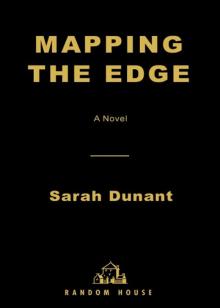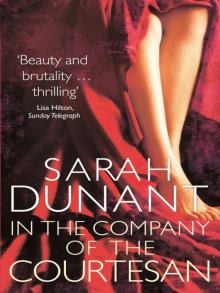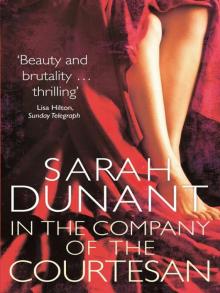- Home
- Sarah Dunant
Transgressions Page 8
Transgressions Read online
Page 8
He rubbed his nose. Then looked up at her. “And you are absolutely sure that you didn’t move the discs yourself? I mean, when you were cleaning or tidying up. . . .”
They both looked at the skyscraper between them. Of course he had to ask. It was, after all, what he was thinking. Just as Sally and Tom had no doubt thought the same thing about the earlier incidents, but had been too polite to say directly. Come to think of it, it was what she herself had been considering only a few hours before. But not now. Not anymore. “No,” she said firmly. “On the contrary. I’m absolutely certain I didn’t.”
He let out a breath. “Well, I’m afraid there’s not much I can do right at this moment. There’s no actual crime been committed, and, as I say, no evidence of any break-in. But, I’ll make a full report and if anything else happens, anything at all, you just call us and we’ll be ’round pronto.”
He snapped his book shut and stood up. Yes, a big man. Did it make him safer on the street at night? she thought. Would she feel less scared now if she had his bulk?
“I see. And is that it? I mean, don’t you want to take the boxes for fingerprinting or something?”
He pretended to give it some thought. “I . . . I don’t think so.” He paused. “Would it . . . would it make you feel better if I took another look around the rest of the house? You know, just to check everything is shipshape?”
“No.” She shook her head, suddenly sick of his condescension, sick of having to ask men to hold her hand. “No. I’m sure it’s just fine.”
“Good, well, then . . .”
She saw him to the door, eager to be rid of him and scared to let him go at the same time. He gave the house a last look, peering up into the spiraling darkness of the staircase. “Big place for you to be in on your own, if you don’t mind my saying. Maybe you should think of getting a lodger.”
“Yeah,” she said. “Perhaps you’ve got some trainee policemen who need a place to stay?” Knowing as she said it that it could only make matters worse.
“Yes, well, I’ll make a note to the station home-beat security officer. He visits a lot of women who live alone. He’ll be able to suggest some nifty security devices. Make you feel more secure anyway. For now I’d just call your local locksmith. He’ll sort you out.”
That’s what I need, she thought, sorting out. Maybe I should call Biderman. Get a cop who isn’t afraid of weird women. And who knows how nasty the world can be.
As the door closed, the silence rushed in to greet her. She turned and looked up into the stairwell. “Hello!” she shouted angrily. “Anybody up there?” She went up the stairs, marching into every room and turning on the lights, leaving all of them on behind her, until the house was ablaze like some ocean liner at night. Then she went through the Yellow Pages until she found a twenty-four-hour locksmith. “All locks changed in under three hours. Guaranteed.” The charge would no doubt be astronomical, but she rang the number anyway.
Back in the kitchen the plastic tower was just as she had left it. She looked at it, calculating the distance between the shelf and the table, how many journeys it would take to move it, why the hell anyone should want to. Then, slowly, she started to dismantle it, keeping note of the order of the discs as she did so; rock ’n’ roll at the top, the few remaining classical albums Tom had left her at the bottom, and the six Van Morrison albums all together, just as they had been on the shelf. No message here. Or none that was obvious. But, then, there wouldn’t have been a lot of time to arrange one. After all, she hadn’t been out for more than forty minutes or so.
She picked them all up, balancing them one on top of the other again, and walked the stack slowly across the room back to its shelf. But the pile was too unstable, and halfway across it disintegrated in the middle, boxes springing out on all sides, clattering to the floor, a couple of them smashing open on the wood, their shimmering little discs rolling like silver wheels into the dishwasher or under the table. She gave a loud cry as the explosion took place. Then one cry turned into another, and soon she was standing in the middle of the room gulping back the sobs.
Something is happening here, she thought frantically. Something is happening that I don’t understand, and if I’m not careful the fear will stop me thinking straight.
It took her a while to get herself back in control. She splashed water on her face from the kitchen tap and used a tea towel to wipe it away. Then, taking deep breaths, she gathered up the fallen CDs, taking great care and attention with each one, checking it for dust or damage, reuniting it with its box, and putting them all back on the shelf. The last one was a two-disc set of Vivaldi string quartets that Tom had brought her back once from a working weekend in Milan. “It’s the acceptable edge of classical. Got tunes. You’ll like it.” He was right. She had. Because of its associations she hadn’t played it since he left. Now suddenly she wanted to hear it again.
The music flowed in like a wave. She turned it up more loudly than its elegance could really bear, then louder still, treating it like rock ’n’ roll. She went over to the French windows and pulled up the catch that released the locks from the top and bottom of the frames and opened both doors out onto the garden.
Outside it was dark and near freezing. She stood staring into the night, her breath making clouds of smoke, her body tensed against the cold. Somehow it made her feel better, the temperature giving her something real to shiver about. Across the long gardens a security light at the back of one of the houses beyond snapped on, fierce, penetrating, then just as suddenly switched off again. Night life. The place was full of it. The feeble glow of the kitchen light picked out a small, dark shape slipping out from the undergrowth across the grass. A cat—not Millie, but her adversary, the ubiquitous black tom. Halfway across the garden it registered her presence and turned, staring straight at her, ears back, body ready to pounce. She held its stare. Then, equally suddenly, it relaxed and moved on and out of sight. Damn animal. It treated the place as if it owned it. Certainly these last few weeks, since the fight with Millie, it was always around, sleeping in the flower beds or dancing its way across the top of the wall. Millie, in contrast, had given up the battle, more often than not spending her days as well as nights inside. Poor Millie. Too young and too active to be confined to the house. Some would say just like her owner.
She closed and locked the French windows, checking the bolts as she did so. The doors had been put in at the same time as the kitchen extension eighteen months ago. The locks were new, too, state of the art apparently, with the inside catch releasing two steel bolts into the top and bottom of the frames. The glass was double-glazed and laminate—burglarproof, her builder had assured her, though evidently he and the police differed on the precise meaning of that phrase. On the other hand, there was still no evidence that anyone had broken in through them. In which case who, or maybe even what, had moved the CDs?
Not yet, she thought. Not yet. Not until I’m ready.
On the table the pizza was cold and congealed in its box. She put it on a baking tray in the oven. Then she got out a salad bowl and started to cut up peppers, lettuce, and mushrooms. She turned off the Vivaldi and tuned in instead to the radio, where someone was talking about a breakthrough in bone marrow transplants, and how things that had seemed impossible only a few years ago would soon be commonplace. She liked that idea and listened carefully, deliberately not thinking of anything else. Gradually the kitchen became hers again, domestic, tamed.
When the salad was ready and dressed she took out the pizza and opened a bottle of wine. The sound of the cork sucking its way out of the bottle made her feel safer. She lit the candles on the table, but didn’t turn the lights off. She had eaten one, maybe two mouthfuls when the doorbell rang. It took the top of her head off even though she was expecting it.
In the crack between the door and the chain a middle-aged man with a worn, moon-shaped face was standing holding a bag. “Locks Today,” he said rather mournfully. “You called.”
She pushed the d
oor forward to release the chain and then he walked in, putting his bag down in the corner. “The front door, is it?”
“Yes.”
He fingered it, turning it, watching the lock snap out and back again. “Hmmn.” Then he looked at her. “You should have asked to see a card, you know.”
“What?”
“Anybody could turn up at your door and say they were from the locksmith’s. You should ask to see some form of identification.”
Amazing, she thought. Now even the good guys are strange. “But you’re the only people who knew I called,” she said.
“Hmmm,” he said again. “You’d be surprised.”
She made him a cup of tea and he set to work. It took him the best part of an hour and a half, replacing the Ingersoll and adding a Chubb. She sat on the stairs watching him. For a recluse she was entertaining a lot of men tonight. It seemed important to keep them all in her sights.
If he found her presence strange he didn’t remark on it. No doubt he was used to nervous women watching his every move. It must be a bit like being a doctor, she thought, always getting called out in times of emergency and distress.
After a while she got hungry and went back into the kitchen and resurrected the pizza. It wasn’t at its best, but he accepted the slice she offered and it started them talking.
When he asked why she was changing the locks, she told him. He listened, eyes still on the wood, chiseling into the hole where the second box would go. She got the impression that the story didn’t surprise him. But, then, presumably he’d heard worse.
“And it was the police who told you to change the locks?”
“Yes.”
He sniffed.
“Why?” she prompted. “What do you think?”
He shrugged. “Well, it can’t hurt, can it? But it doesn’t sound to me like you’ve got anyone coming through your front door.”
“No?”
“Well, to start with, all this stuff happened in the kitchen, right?”
“Yes.”
“So why go in there and not in the living room or upstairs? You can scare someone a lot more by doing stuff up there, I can tell you.”
And it was clear that he could. She decided not to ask. She wondered how old he was. Late fifties? Maybe older. Her father would have been seventy-eight now had he lived. Her mother nine years younger. When she was growing up, she had got used to him being old, to being the only child of aging parents, but she still wondered what she had missed, not having him around when she was an adult. Maybe she would have depended less on Tom. Made him more a lover and less a parent. Well, it was all academic now. To lose one parent prematurely is a misfortune, to lose two is what? Bad luck or bad karma? Do orphans have more trouble with long-term relationships? She offered him another slice. He shook his head. “So what do you think?”
“About this?”
“Yeah.”
He stopped chiseling and tried the box. It slipped in neatly. He stood back and looked at his work. “You’ll think I’m daft.”
She gave a laugh. “No dafter than everyone thinks I am, I can tell you.”
He looked at her. “I think you might have some kind of poltergeist.”
And as he said it something turned over in her stomach, something hot and cold at the same time, and she realized that she had been waiting for someone to suggest if not this, then something like it. “Have you . . . I mean, have you come across things like this before?”
“There’s not a lot I haven’t come across doing this job. But yeah, I’ve seen houses that have had some kind of spirit in them. One lady in the East End had me change all the locks on the doors and windows six times in as many months. It didn’t do any good. She’d still wake up in the morning to find them open again. Nothing taken, nothing harmed. Just wide open again. Back door mainly and the two upstairs skylights. Mischievous little tyke that was.”
“My God. What did she do?”
“No idea. All I know is I stopped doing her locks. I think she probably moved in the end. It’s usually either them or you. Unless you just get on with it and leave them to it.”
“And what makes you think that’s what’s happening here?” she asked almost in a whisper.
“Nothing, except it fits the facts, that’s all. You’ve got stuff happening you can’t explain. It’s not—what’s the word that the woman used to use to me?—not malevolent. Peculiar rather than serious. You say the house feels all right, that you don’t feel scared in between times. And it always happens in the same place. The only funny thing is you’ve not come across it before. From the couple I’ve come across they usually seem to make their presence felt as soon as they find the right person.”
I don’t believe this, she thought. It’s absolute nonsense, like watching some dreadful New Age documentary on television. I don’t believe a word of it. But even as she thought it, she knew that she did. “I . . . well, I haven’t always been alone here. I mean, I lived with someone for the first two years. He’s only recently moved out.”
“And all this has started since?” She nodded. He made a little noise with his tongue. “Well, then, I’d say that’s what you’ve got.”
He stood up and slipped the new key into the lock, then turned it to and fro. It clicked out and in smoothly. He handed it to her, along with a couple of spares.
“What should I do?” she asked, panic-stricken that now that he was finished he might go and leave her.
He bent down and started packing up his tools, “I suppose that depends on you. I mean, on how upset it makes you living with it. Sometimes I gather they just go away. Something about the energy around them. I can’t say I understand that really. You could always see a priest. Come to think of it, that woman I told you about—with the open windows—I think that’s what she did in the end. Got some kind of exorcism done on the place. Though I don’t know how much good that’ll do you.”
“But I don’t believe in God.”
He shrugged. “I don’t believe in luck but I still do the lottery every week. You could always give it a try. It’d be cheaper than fitting new locks, that’s for sure.”
He was writing something on a pad. Maybe he carried certain addresses with him in his head. “Still, you won’t be bothered with burglars for a while.” He looked up. “I can knock off the tax if you’ve got cash. Otherwise the boss insists on a check with a banker’s card number, though, course, you don’t need to put your address on.”
It took her a while to realize the last bit was a joke. She stared at him as he handed her the bill. It hadn’t all been a joke, had it?
She laughed. “I’ll . . . er . . . I’ll get you a check. It’s in my study.” She started to go up the stairs, then she turned. “You’re not . . . I mean, you really think that’s what this is?”
He looked up at her and shrugged. “Listen, you asked me what I thought, and I told you. I said you’d find it daft. With tax that’ll be one hundred and seventy-nine pounds forty, including the call-out charge.”
seven
She lay awake for hours after he left, the kitchen door locked, the hall light on, Millie heavy in sleep at the end of the bed.
In the semidarkness of the room, the house felt as it always did: empty, quiet, nothing to get worked up about, unless of course you chose to infect it with your own anxiety. But even as she lay there, theoretically scared witless by the prospect of some kind of presence around her, she felt okay. Despite whatever it was.
Whatever it was . . . That was the point where it all came apart. How exactly do you think about something you don’t believe in? How does one visualize something that doesn’t exist?
What had the locksmith said? That it/they usually make their presence felt as soon as they find the right person. Is that what had happened with her? She’d split up with Tom and in the spaces left in between she’d become a conduit for some kind of lost spirit that had been hovering around, looking for someone appropriate to latch on to. She remembered reading somewhere h
ow poltergeists tended to favor young women, girls on the edge of puberty. Maybe hers was only a learner, had mistaken her fondness for Van Morrison for teenage rebellion.
She shook her head. No. It was absurd. All of it. There was nothing living in this house but her. Her and her subconscious. And since when had that been so demented as to be obsessed with the movement of CDs around kitchen surfaces? No. The only supernatural thing about this evening had been the size of the locksmith’s bill.
But if that wasn’t the answer, then what was? How did one explain the movement of thirty-three CDs from one side of the kitchen to the other? The question played and replayed inside her head like a swarm of flies, until it was hard to make out the sense for the buzzing. Someone or something was getting into her house and trying to scare her. That much was fact. If it wasn’t supernatural (even the word sounded mildly ridiculous) and it wasn’t Tom, then it had to be someone else. But who? What kind of intruder would go to such lengths just to play games? Disappearing CDs, manipulating stereos, moving stuff around the room? It hardly amounted to a sustained campaign of terror. On the contrary, it was more like mischief than malice.
“Of course that’s what it is, darling.” Sally’s voice wafted into her mind, loud and clear. God help any poltergeist that ever tried to muscle in on Sally’s territory. No room. No room.
She let the voice continue, if only to drown out anything else. “I mean, think about it. The police must come across this kind of thing all the time. You obviously just left your handbag somewhere—you know what a ditz head you were those first few weeks after Tom moved out, you were always leaving something somewhere—someone picked it up, maybe even took a duplicate, and, hey presto, decided to have a bit of nasty fun at your expense. They probably live nearby, on the same street or something so they can see when you’re not there. There’s that empty house three doors down, isn’t there? It’s just the kind of thing someone there would do for a laugh. Freaking out the bourgeoisie. Nice couple of CDs and then a bit of intimidation. I mean, look what it’s done to you. Got you listening to spook tales from some guru locksmith, for God’s sake. Poltergeists! You’ll be a candidate for the funny farm if you go on like this much longer, Eliza. What you need is to get out more and have a bit of—”

 Mapping the Edge
Mapping the Edge The Birth of Venus
The Birth of Venus In the Name of the Family
In the Name of the Family Snowstorms in a Hot Climate
Snowstorms in a Hot Climate In the Company of the Courtesan
In the Company of the Courtesan Birth Marks
Birth Marks Transgressions
Transgressions Under My Skin
Under My Skin Blood & Beauty: A Novel of the Borgias
Blood & Beauty: A Novel of the Borgias Blood & Beauty
Blood & Beauty Sacred Hearts
Sacred Hearts In the Company of the Courtesan: A Novel
In the Company of the Courtesan: A Novel